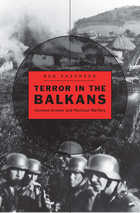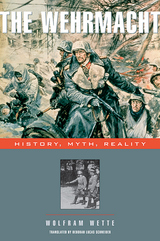

In the beginning, they rallied behind Hitler in the national interest of Germany; in the end, they sacrificed their lives to assassinate him. A history of German resistance to Hitler in high places, this book offers a glimpse into one of the most intractable mysteries. Why did high-ranking army officers, civil servants, and religious leaders support Hitler? Why did they ultimately turn against him? What transformed these unlikely men, most of them elitist, militaristic, and fiercely nationalistic, into martyrs to a universal ideal?
The resisters in On the Road to the Wolf's Lair are not the singular souls doomed to failure by the massive Nazi machinery, but those who emerged from the Third Reich itself--those people whose cultural, administrative, and military positions allowed them, ultimately, to form a systematic, organized opposition to the Nazi regime. These were people with a vested interest in the Third Reich, and their slow and painful awakening to its evils makes a dramatic story, marked as much by temporizing and compromise, vacillation and reluctance--a resistance to conscience--as by the intrigue and heroics of political resistance that finally emerged. Hamerow follows these men as, one by one, they find themselves overwhelmed by guilt and contrition over their support of a murderous regime. He shows how their awakened moral reckonings and higher interests overrode lifetime habits and disciplines on the road to "the wolf's lair."
The result is an unsparing history of the German resistance to Hitler--one where the players emerge for the first time as real people with complex motives and evolving characters. Almost a history of the possibility of an emerging collective moral conscience within a destructive environment, the book adds to our understanding of the fall of the Third Reich and of the task of history itself.


Germany’s 1941 seizure of Yugoslavia led to an insurgency as bloody as any in World War II. The Wehrmacht waged a brutal counter-insurgency campaign in response, and by 1943 German troops in Yugoslavia were engaged in operations that ranked among the largest of the entire European war. Their actions encompassed massive reprisal shootings, the destruction of entire villages, and huge mobile operations unleashed not just against insurgents but also against the civilian population believed to be aiding them. Terror in the Balkans explores the reasons behind the Wehrmacht’s extreme security measures in southern and eastern Europe.
Ben Shepherd focuses his study not on the high-ranking generals who oversaw the campaign but on lower-level units and their officers, a disproportionate number of whom were of Austrian origin. He uses Austro-Hungarian army records to consider how the personal experiences of many Austrian officers during the Great War played a role in brutalizing their behavior in Yugoslavia. A comparison of Wehrmacht counter-insurgency divisions allows Shepherd to analyze how a range of midlevel commanders and their units conducted themselves in different parts of Yugoslavia, and why. Shepherd concludes that the Wehrmacht campaign’s violence was driven not just by National Socialist ideology but also by experience of the fratricidal infighting of Yugoslavia’s ethnic groups, by conditions on the ground, and by doctrines that had shaped the military mindsets of both Germany and Austria since the late nineteenth century. He also considers why different Wehrmacht units exhibited different degrees of ruthlessness and restraint during the campaign.

In Nazi eyes, the Soviet Union was the “wild east,” a savage region ripe for exploitation, its subhuman inhabitants destined for extermination or helotry. An especially brutal dimension of the German army’s eastern war was its anti-partisan campaign. This conflict brought death and destruction to thousands of Soviet civilians, and has been held as a prime example of ordinary German soldiers participating in the Nazi regime’s annihilation policies.
Ben Shepherd enters the heated debate over the wartime behavior of the Wehrmacht in a detailed study of the motivation and conduct of its anti-partisan campaign in the Soviet Union. He investigates how anti-partisan warfare was conducted, not by the generals, but by the far more numerous, average Germans serving as officers in the field. What shaped their behavior was more complex than Nazi ideology alone. The influence of German society, as well as of party and army, together with officers’ grueling yet diverse experience of their environment and enemy, made them perceive the anti-partisan war in varied ways. Reactions ranged from extreme brutality to relative restraint; some sought less to terrorize the native population than to try to win it over. The emerging picture does not dilute the suffering the Wehrmacht’s eastern war inflicted. It shows, however, that properly judging ordinary Germans’ role in that war is more complicated than is indicated by either wholesale condemnation or wholesale exoneration.
This valuable study offers a nuanced discussion of the diversity of behaviors within the German army, as well as providing a compelling exploration of the war and counterinsurgency operations on the eastern front.

This book is a profound reexamination of the role of the German army, the Wehrmacht, in World War II. Until very recently, the standard story avowed that the ordinary German soldier in World War II was a good soldier, distinct from Hitler's rapacious SS troops, and not an accomplice to the massacres of civilians. Wolfram Wette, a preeminent German military historian, explodes the myth of a "clean" Wehrmacht with devastating clarity.
This book reveals the Wehrmacht's long-standing prejudices against Jews, Slavs, and Bolsheviks, beliefs that predated the prophecies of Mein Kampf and the paranoia of National Socialism. Though the sixteen-million-member German army is often portrayed as a victim of Nazi mania, we come to see that from 1941 to 1944 these soldiers were thoroughly involved in the horrific cleansing of Russia and Eastern Europe. Wette compellingly documents Germany's long-term preparation of its army for a race war deemed necessary to safeguard the country's future; World War II was merely the fulfillment of these plans, on a previously unimaginable scale.
This sober indictment of millions of German soldiers reaches beyond the Wehrmacht's complicity to examine how German academics and ordinary citizens avoided confronting this difficult truth at war's end. Wette shows how atrocities against Jews and others were concealed and sanitized, and history rewritten. Only recently has the German public undertaken a reevaluation of this respected national institution--a painful but necessary process if we are to truly comprehend how the Holocaust was carried out and how we have come to understand it.
READERS
Browse our collection.
PUBLISHERS
See BiblioVault's publisher services.
STUDENT SERVICES
Files for college accessibility offices.
UChicago Accessibility Resources
home | accessibility | search | about | contact us
BiblioVault ® 2001 - 2024
The University of Chicago Press









